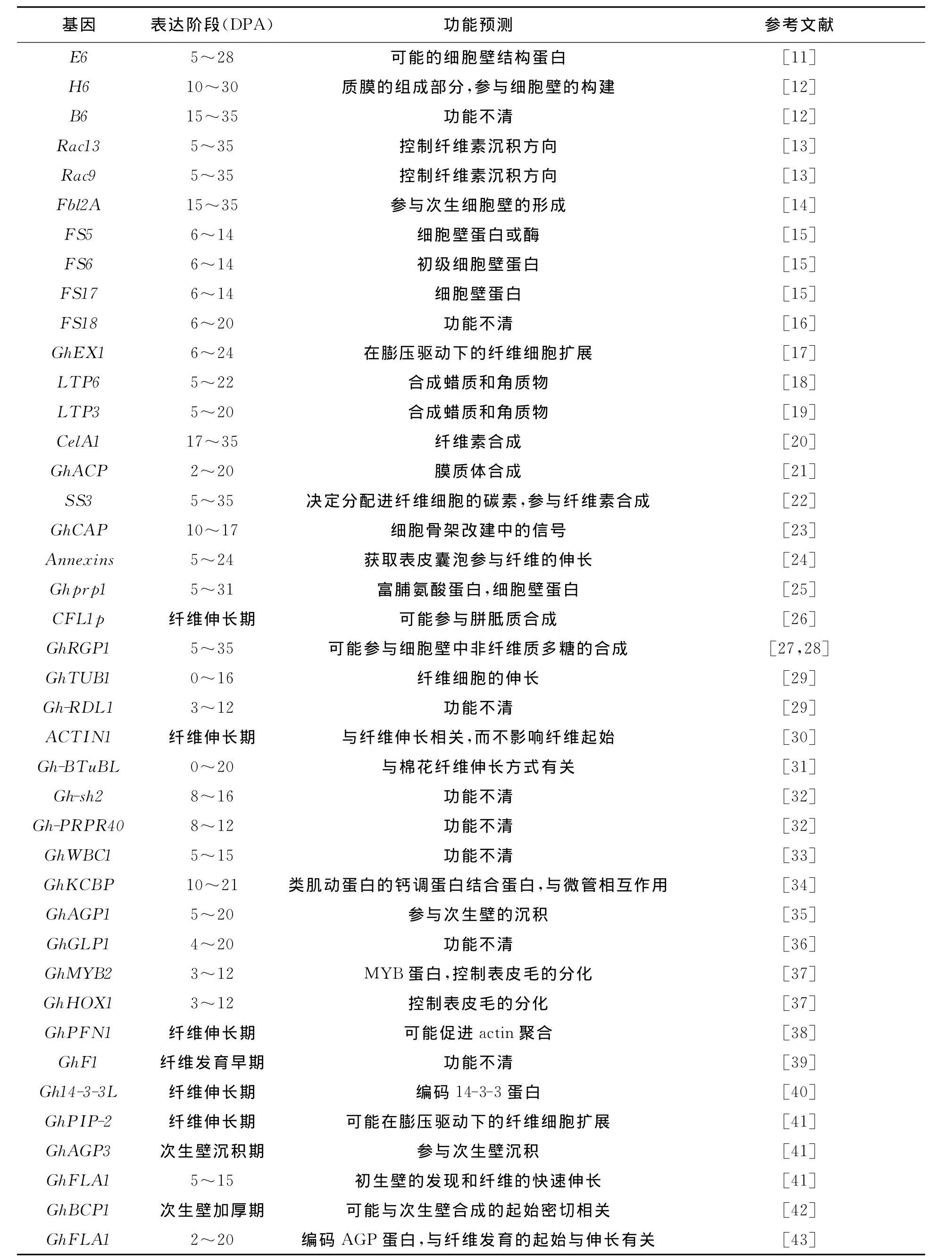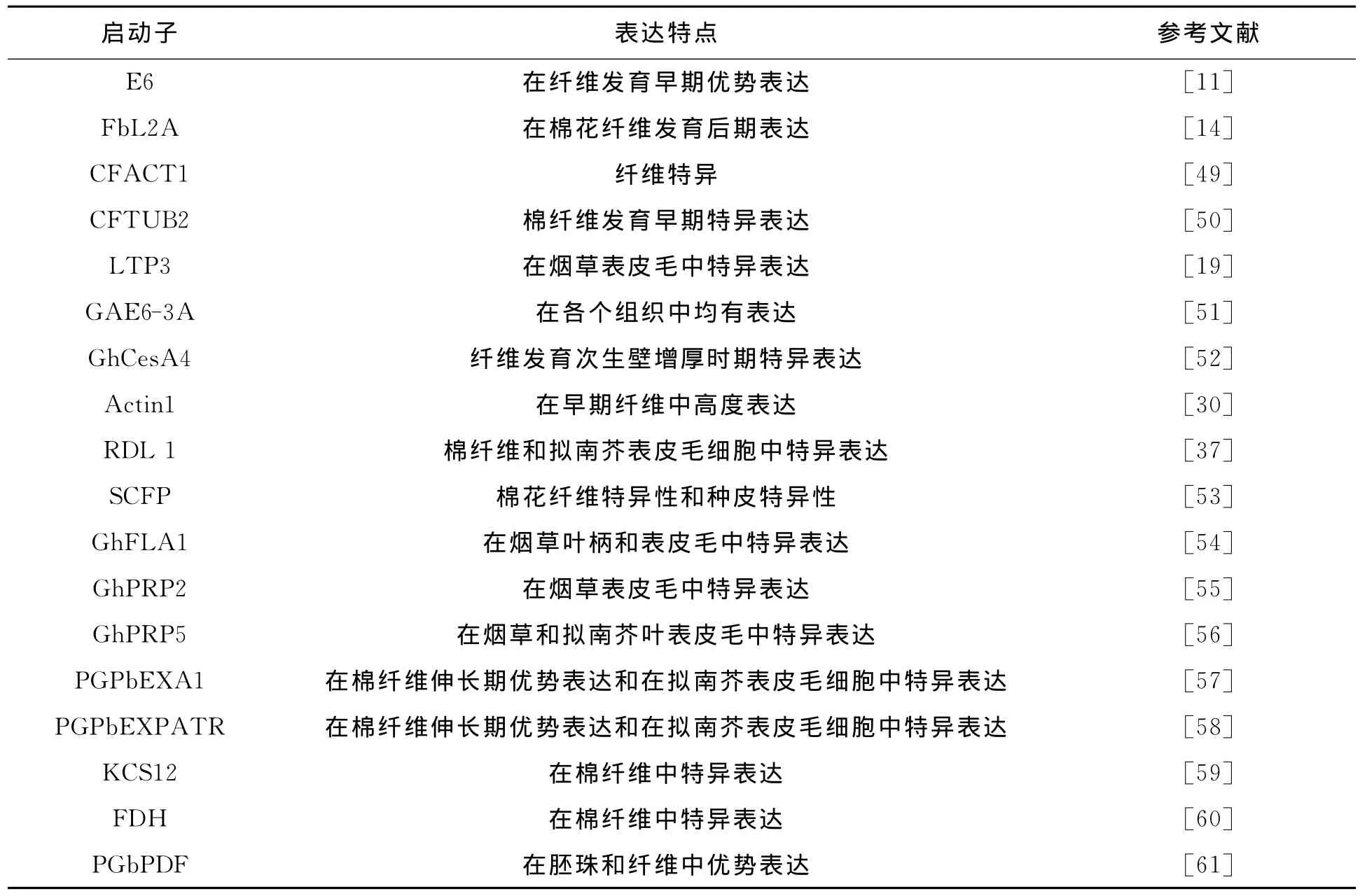棉纤维特异基因及其特异启动子的研究进展
吕少溥, 王旭静, 唐巧玲, 王志兴
中国农业科学院生物技术研究所,北京 100081
棉花是世界上的重要经济作物之一,为纺织业及其相关产业提供主要原材料。我国是世界上最大的纺织品生产国和消费国,棉花产业在我国的国民经济中占有举足轻重的地位[1]。“十一五”期间,农业部对我国主产棉省主栽的白色棉花品种纤维的抽查结果表明:纤维长度主要分布在28~30mm,属于中绒档次;纤维整齐度指数高在83%~85%;断裂比强度处于中等偏上水平,主要分布在26~28cN/tex和29~31cN/tex;马克隆值主要分布在4.3~4.9左右,以B1和C2为主,处于A级最佳范围的样品则偏少[2]。由于长度在31mm以上、断裂比强度大于31cN/tex,以及马克隆值在A级最佳范围的纤维比较缺乏,导致我国棉花纤维质量只能满足纺织工业中、低档棉纱(32~40支纱)的纺织要求,可纺高支纱(60~80支)的原棉纤维所占比例较少[2]。
棉花产量和纤维质量呈负相关关系,因此利用常规育种手段很难同时提高棉花产量和品质。随着生物技术的飞速发展,基因工程手段已经广泛应用于农作物的品种改良中。棉花的分子育种已成为国内外棉花研究的重点[3]。克隆与棉花纤维发育相关的基因及其特异表达启动子可以实现定向改良棉花纤维品质的目的,本文综述了棉纤维的发育过程及相关基因与特异性启动子的研究进展,以期为改良棉花纤维品质提供研究参考。
1 棉花纤维的发育过程
棉纤维是由棉花胚珠外珠被表皮层的单细胞发育而成,其分化和发育过程可分为四个时期[4]。
1.1 纤维原始细胞分化期
棉纤维发育初期,由胚珠表皮细胞分化形成纤维原始细胞,并进一步扩展为球状或半球状突起。纤维细胞的分化时间与成熟纤维的长度相关,如果在开花前3d到开花当天分化,则纤维细胞通常形成长纤维(Lint,一般长度为20~30 mm);而在开花后5~10d分化的细胞则发育为短绒(Fuzz,一般长度为2~5mm)[5]。
1.2 纤维细胞伸长期
棉纤维细胞的伸长始于开花当天,一般持续20d左右。在伸长期,纤维细胞中部形成大液泡,液泡膨胀使细胞快速伸长,并伴随合成纤维细胞的初生壁[6]。伸长期主要影响棉纤维的长度[7]。
1.3 次生壁加厚期
在开花后16~19d,进入纤维细胞次生壁增厚期,一直持续到开花后40~50d[8],与伸长期有5~10d的重叠[9]。此期间,细胞合成大量的纤维素沉积在次生壁上,使次生壁不断增厚。次生壁加厚期与纤维细度、成熟度以及纤维强度相关。
1.4 成熟期
开花后45~60d进入棉纤维细胞成熟期。成熟期间,棉铃开裂、吐絮,纤维失水、扭曲,最终发育成熟。成熟期主要影响纤维的扭曲数[10]。
2 棉花纤维特异基因的研究
虽然对棉花纤维的分子发育过程已较为清楚,但与棉花纤维发育相关基因的研究相对滞后。随着分子生物学的发展,采用cDNA文库差示筛选技术、cDNA代表性差异分析技术、抑制差减杂交技术和mRNA差异显示技术等,现已克隆得到数十个棉花纤维特异或优势表达的基因(见表1)[11~43],近年来基因芯片技术、高通量测序技术[44]为棉花纤维特异基因的获得提供了更为高效的手段。
虽然已经克隆得到许多棉纤维特异或优势表达的基因,但是大部分基因多是在烟草或拟南芥中进行验证,很少一部分是直接在棉花中进行验证的,所以得到的大部分基因在棉花纤维中的具体作用尚不清楚,只能作为棉纤维品质改良的候选基因。在棉纤维中功能研究的比较清楚的有E6、SS3、GaMYB2 等。
2.1 E6 基因
1992年,John等[11]通过cDNA文库的差示筛选技术发现了E6基因。它是发现最早的棉纤维优势表达的基因,主要在棉纤维伸长阶段表达,在开花后5~28d都有表达。E6基因具有714bp的开放读码框,编码238个氨基酸。1996年,John等[45]通过35S启动子连接E6的反义基因转化棉花,发现E6蛋白表达下降了60%~98%,但是在纤维的发育中没发现明显的表型变化,对纤维的品质没有影响,说明E6对棉纤维的发育作用不大,或者棉纤维发育过程需要的E6蛋白量极低。
2.2 SS3 基因
1997年,Ruan等[22]发现了编码蔗糖合成酶的基因SS3,该基因在开花后0~35d表达,决定分配进入纤维细胞的碳素,参与纤维素合成。2003年,Ruan等[46]构建了棉花蔗糖合成酶反义基因载体转化棉花,以非转反义基因的棉花为对照,观察不同时期棉花胚珠,发现相对于对照组,转基因植株的胚珠大小不变,但是在开花0d的胚珠表面有很少的突起,还伴随着塌陷与皱缩,开花后3d转基因植株的的棉纤维很短。上述结果说明,蔗糖合成酶基因在棉纤维起始和伸长中发挥重要作用。
2.3 GhMYB2 基因
GhMYB2是棉纤维发育过程中优势表达的一个蛋白。2004年,Wang等[37]通过转化拟南芥,证明GhMYB2基因的第一个内含子在拟南芥的表皮毛发育过程中发挥重要作用。研究表明,该基因是表皮毛发育基因的增强子,而不是表皮毛基因的抑制因子。第一个内含子中保守的MYB结构的缺失将影响表皮毛的发育。2008年,Shangguan等[47]用过量表达和RNA干扰的方式构建了植物表达载体转化棉花,发现降低实验组陆地棉GhMYB2基因的表达会导致开花当天纤维分化突起数量相对于对照组明显减少,而且3-DPA的纤维伸长明显短于对照组,最终成熟后实验组的成熟纤维也比对照组短。棉花种子的发育也受到GhMYB2基因表达的较大影响,相对于对照组,降低GhMYB2基因表达的棉花种子变小,成熟率降低;而过量表达GhMYB2基因的实验组其成熟棉纤维变长,种子也变大。另外,无论是降
低GhMYB2基因的表达还是过量表达GhMYB2基因都能在转基因棉花后代中稳定的遗传。所以Shangguan等认为GhMYB2基因是对棉花纤维的伸长有重要调控作用,而且还会影响种子的发育。

表1 已克隆的棉花纤维特异表达基因 Table 1 Cotton fiber specific gene.
3 棉花纤维特异表达启动子的研究
早期,研究人员多用组成型启动子表达棉纤维特异基因,以研究基因功能。而随着研究的进一步发展,发现组成型启动子具有一定的缺陷,即组成型启动子可以驱动目的基因在各个时期都表达,不仅会消耗棉花体内大量能量物质,而且会影响了植物的生长发育[48]。为了解决这个问题,研究人员采用染色体步移等技术克隆了棉纤维的特异启动子,目前已经克隆得到数十个棉花纤维优势表达的启动子(表2)[11,14,19,30,37,49~61]。

表2 棉花纤维优势启动子 Table 2 Cotton fiber advantage promoter.
克隆得到的棉纤维启动子由于具有应用前景,大多已经申请专利,有一部分已应用到棉花纤维改良中。1996年,John等[61]用E6启动子和FbL2A启动子分别连接乙酰CoA还原酶基因和PHB合酶基因,导入棉花提高了棉花纤维的热绝缘性能;2002年,李文彬等[62]利用LTP12启动子连接表达靛蓝色素BCE基因和表达红色花色素合成酶DFR基因,转化棉花后获得了靛蓝色和和红色的棉纤维;2004年,张震林等[63]将E6启动子连接兔角蛋白基因转入棉花,改良了棉花纤维的强度,与对照相比,平均提高了6.3cN/tex;2007年,Xu等[64]用LTP3启动子连接TYRA和ORF38黑色素合成酶基因并导入棉花,获得了褐色表型的棉纤维;2010年,孟亚雄等[65]将LTP12棉纤维特异启动子连接表达PHB合成酶的基因导入棉花,改良了棉纤维的保暖性和抗皱性。
4 展望
随着分子生物学技术日新月异的发展,特别是高通量技术的出现,为特异基因的克隆提供了极大的便利;随着染色体步移技术的改进,对特异基因上游启动子的查找提供了越来越多的办法,这些都为用基因工程方法改进棉纤维品质提供了参考方案。但是,棉纤维的发育过程是一个复杂的多基因参与的过程,基因工程改良棉纤维品质的研究存在很大的难度。第一,增加或者删除某一个基因并不一定能对棉纤维品质的改变造成重大影响,如反义表达E6基因,E6蛋白表达下降了60%~98%,但对纤维发育没有明显影响;第二,棉花基因工程研究中,棉花的转化效率很低,目前棉花转化多采用农杆菌介导法,由于种植棉多为异源四倍体植株,农杆菌所携带的目的基因随机整合,其转化效率很低。克隆棉纤维特异基因及其启动子为棉纤维品质的改良确定了一条路径,随着生物技术的发展以及对棉花发育的深入研究,分子育种和常规育种结合将成为以后改良棉花纤维品质的趋势。
[1] 刘金海.我国棉种产业化现状与前景展望[J].棉花学报,2007,19(5):411-416.
[2] 杨伟华,唐淑荣.“十一五”期间我国生产领域棉花纤维品质分析[J].中国化纤,2011,8(上):18-22.
[3] 刘进元,赵广荣,李 骥.棉花纤维品质改良的分子工程[J].植物学报,2000,42(10):991-995.
[4] 徐楚年,余炳义,张 仪.棉花四个栽培种纤维发育的比较研究[J].北京农业大学学报,1988,14(2):113-119.
[5] Andrawis A,Solomon M,Delmer D P.Cotton fiber annexins:a potential role in the regulation of callose synthase[J].The Plant J.,1993,36(2):763-772.
[6] Seagull R.Growth mechanisms in developing cotton fiber:where is the fiber expanding [A].In:Nijmegen,The Netherlands:Abstract from the Sixth Cell Wall Meeting[C].1992,62.
[7] Delanghe E A L.Lint development[A].In:Mauney J R,Stewart J M (eds).Cotton Physiology[M].Memphis,T N:Cotton Foundation,1986,325-349.
[8] Meinert M C,Delmer D P.Changes in biochemical composition of the cell wall of the cotton fiber during development[J].Plant Physiol.,1977,59(6):1088-1097.
[9] Ryser U.Cell wall biosynthesis in differentiating cotton fibers[J].Euro.J.Cell Biol.,1985,39:236-256.
[10] Schubert A M,Benedict C R,Berlin J D,et al..Cotton fiber development kinetics of cell elongation and secondary wall thickening[J].Crop Sci.,1973,13(6):704-709.
[11] John M E,Crow L J.Gene expression in cotton(Gossypium hirsutumL.)fiber:cloning of the mRNAs[J].Proc.Natl.Acad.Sci.USA,1992,89(13):5769-5773.
[12] John M E.Characterization of a cotton(Gossypium hirsutumL.)fiber mRNA(Fb-B6)[J].Plant Physiol.,1995,107(4):1477-1478.
[13] Delmer D P,Pear J R,Andrawis A,et al..Genes encoding small GTP binding proteins analogous to mammalian Rac are preferentially expressed in developing cotton fibers[J].Mol.Gen.Genet.,1995,248(1):43-51.
[14] Rinehart J A,Petersen M W,John M E.Tissue specific and developmental regulation of cotton gene FbL2A.Demonstration of promoter activity in transgenic plants[J].Plant Physiol.,1996,112(3):1331-1341.
[15] Orford S J,Timmis J N.Abundant mRNAs specific to the developing cotton fiber[J].Theor.Appl.Genet.,1997,94(6-7):909-918.
[16] Orfold S J, Carney T J,Olesnicky N S, et al..Characterization of a cotton gene expressed latein fiber cell elongation[J].Theor.Appl.Genet.,1999,98(5):757-764.
[17] Orford S J,Timmis J N.Specific expression of an expansin gene during elongation of cottonfibers[J].Biochim.Biophys.Acta,1998,1398:342-346.
[18] Ma D P,Tan H,Si Y,et al..Differential expression of a lipid transfer proteingene in cotton fiber[J].Biochim.Biophys.Acta,1995,1257:81-84.
[19] Liu H C,Greech R G,Jenkins J N,et al..Cloning and promoter analysis of the cotton lipid transfer protein gene ltp3[J].Biochim.Biophys.Acta,2000,1487(1):106-111.
[20] Pear J R,Kawagoe Y,Schreckengost W E,et al..Higher plants contain homologs of the bacterial celA genes encoding the catalytic subunit of cellulose synthase[J].Proc.Natl.Acad.Sci.USA,1996,93(22):12637-12642.
[21] Song P,Allen R D.Identification of a cotton fiber-specific acyl carrier protein cDNA by differential display[J].Biochim.Biophys.Acta,1997,1351:305-312.
[22] Ruan Y L,Chourey P S,Delmer D P,et al..The differential expression of sucrose synthase in relation to diverse patterns of carbon portioning in developing cotton seed[J].Plant.Physiol,1997,115(2):375-385.
[23] Kawai M,Aotsuka S,Uchimiya H.Isolation of a cotton CAPgene:homologue of adenylyl cyclase associated protein highly expressed during fiber elongation [J].Plant Cell Physiol.,1998,39(12):1380-1383.
[24] Shin H S,Brown R M.GTPase activity and biochemical characterization of a recombinant cotton fiber annexin [J].Plant Physiol.,1999,119(3):925-934.
[25] Tan H,Creech R G,Jenkins J N,et a1..Cloning and expression analysis of two cotton(Gossypium hirsutumL.)genes encoding cell wall proline-rich proteins[J].DNA Seq.,2001,12(5-6):367-380.
[26] Cui X,Shin H,Song C,et al..A putative plant homolog of the yeast beta-1,3-glucan synthase subunit FKS1from cotton(Gossypium hirsutumL.)fibers[J].Planta,2001,213(2):223-230.
[27] Zhao G R,Liu J Y,Du X M.Molecular cloning and charaterization of cotton cDNAs expressed in developing fiber cells[J].Biosci.Biotechnol.Biochem.,2001,65(12):2789-2793.
[28] Zhao G R,Liu J Y.Isolation of a cotton RGP gene:a homolog of reversibly glycosylated polypeptide highly expressed during fiber development[J].Biochim.Biophys.Acta,2002,1574(3):370-374.
[29] Li X B,Cai L,Cheng N H,et al.. Molecular characterization of the cotton GhTUB1 gene that is prefer entially expressed in fiber[J].Plant Physiol.,2002,130(2):666-674.
[30] Li X B,Fan X P,Wang X L,et al..The cotton ACTIN1 gene is functionally expressed in fibers and participates in fiber elongation[J].Plant Cell,2005,17(3):859-875.
[31] Ji S J,Lu Y C,Li J,et al..Aβ-tubulin-like cDNA expressed specifically in elongating cotton fibers induces longitudinal growth of fissionyeast[J].Biochem.Biophys.Res.Comm.,2002,296:1245-1250.
[32] Xiao Y H,Luo M,Zheng S Y,et al..Cloning and charaeterization of polyphosphoinositide binding protein(Ghsh2)gene from cotton [J]. Cotton Sci.,2002,14(Supl.):66.
[33] Zhu Y Q,Xu K X,Luo B,et al..An ATP-binding cassette transporter GhWBC1from elongating cotton fibers[J].Plant Physiol.,2003,133(2):580-588.
[34] Preuss M L,Delmer D P,Liu B.The cotton kinesin-like calmodulin-binding protein associates with cortical microtubules in cotton fibers[J].Plant Physiol.,2003,132(1):154-160.
[35] Ji S J,Lu Y C,Feng J X,et al..Isolation and analyses of genes preferentially expressed during early cotton fiber development by subtractive PDR and cDNA array [J].Nucl.Acids Res.,2003,31(10):2534-2543.
[36] Kim H J,Triplett B A.Cotton fiber germin-like protein.I.molecular cloning and gene expression[J].Planta,2004,218(4):516-524.
[37] Wang S W,Wang J W,Yu N,et al..Control of plant trichome development by a cotton fiber MYB gene[J].Plant Cell,2004,16(9):2323-2334.
[38] Wang H Y, Yu Y, Chen Z L, et al.. Functional characterization of Gossypium hirsutum profilin1gene(GHPEN1)in tobacco suspension cells[J].Planta,2005,222(4):594-603.
[39] 孙 杰,李艳军,李园莉,等.棉花纤维特异表达基因GhF1的分离及鉴定[J].棉花学报,2005,17(5):259-263.
[40] Li X,Shi H,Wang X.Molecular characterization of cotton 14-3-3Lgene preferentially expressed during fiber elongation[J].J.Genet.Genomics,2007,34(2):151-159.
[41] Liu D Q,Tu L L,Li Y J,et al..Genes encoding fasciclinlike arabinogalactan proteins are specifically expressed during cotton fiber development[J].Plant Mol.Biol.Rep.,2008,26(2):98-113.
[42] 田 琴,李艳军,孙 杰,等.棉纤维特异表达蓝铜蛋白基因(GhBCP1)的克隆与鉴定[J].中国农业科学,2010,43(3):612-617
[43] Huang G Q,Gong S Y,Li X B,et al..A fasciclin-like arabinogalactan protein,GhFLA1,is involved in fiber initiation and elongation of cotton[J].Plant Physiol.,2013,161(3):1278-1290.
[44] 周 华,张 新,刘腾云,等.高通量转录组测序的数据分析与基因发掘[J].江西科学,2012,(5):607-610.
[45] John M E. Structural characterization of genescorresponding to cotton fiber mRNA,E6:reduced E6protein in transgenic plants by antisense gene[J].Plant Mol.Biol.,1996,30(2):297-306.
[46] Ruan Y L,Llewellyn D J,Furbank R T.Suppression of sucrose synthase gene expression represses cotton fiber cell initiation,elongation,and seed development [J].Plant Cell,2003,15(4):952-964.
[47] Shangguan X X,Xu B,Yu Z X,et al..Promoter of a cotton fibre MYB gene functional in trichomes of Arabidopsis and glandular trichomes of tobacco[J].J.Exp.Bot.,2008,59(13):3533-3542.
[48] 刘进元,赵广荣,李 骥,等.棉花纤维品质改良的分子工程[J].植物学报,2000,42(10):991-995.
[49] 李学宝,蔡 林,程宁辉,等.来自棉花的纤维特异性肌动蛋白启动子的分离和鉴定[P].新加坡,00813722,2000-08-01.
[50] 蔡 林,李学宝,程宁辉,等.来自棉花的纤维特异性β-微管蛋白启动子的分离和鉴定[P].新加坡,00813724,2000-08-01.
[51] 于晓红,朱 勇,清林芝,等.亚洲棉GAE6-3A上游序列的分离及其在烟草中的表达[J].科学通报,2000,26(2):143-147.
[52] Kim H J,Murai N,Fang D D,et al..Functional analysis of Gossypium hirsutum cellulose synthase catalytic subunit 4 promoter in transgenic Arabidopsis and cotton tissues[J].Plant Sci.,2011,180(2):323-332.
[53] 侯磊,刘灏,裴炎,等.一个具有棉花纤维细胞特异性的启动子SCFP[J].科学通报,2008,53(14):1650-1656.
[54] 李学宝,黄耿青,许文亮,等.一个棉纤维特异性启动子GhFLA1的鉴定[P].中国,200910273465.3,2009-12-29.
[55] 李学宝,李登弟,王秀兰,等.棉花纤维特异表达的水孔蛋白家族基因GhPIP2[P].中国,200910273363.1,2009-12-23.
[56] 李学宝,许文亮,黄耿青,等.一个棉纤维特异表达基因GhPRP5及其启动子[P].中国,200910273296.3,2009-12-16.
[57] 涂礼莉,李 阳,张献龙,等.两个棉花纤维伸长期优势表达的启动子及应用 [P].中国,201010582387.8,2010-12-06.
[58] 朱玉贤,秦咏梅,柳皋隽.棉花KCS12基因的启动子及其应用[P].中国,201010540932,2010-11-10.
[59] 朱玉贤,秦咏梅,柳皋隽.棉花FDH基因的启动子及其应用[P].中国,201010291850,2010-09-26.
[60] Deng F L,Tu L L,Zhang X L.GbPDF1(protodermal factor 1)is involved in cotton fiber initiation via the core cis-element HDZIP2ATATHB 2[J].Plant Physiol.,2012,158:890-904.
[61] John M E,Kell G.Metabolic pathway engineering in cotton biosynthesis of polydroxybutyrate in fiber cells[J].Proc.Natl.Acad.Sci.USA,1996,93(23):12768-12773.
[62] 李文彬,宋 晶,孙勇如,等.bec基因棉花纤维特异性表达载体[P].中国CN1446916,2002-03-25.
[63] 张震林,刘正銮,周宝良,等.转兔角蛋白基因改良棉纤维品质研究[J].棉花学报,2004,16(2):72-76.
[64] Xu X Q,Wu M G,Zhao Q,et al..Designing and transgenic expression of melanin gene in tobacco trichome and cotton fiber[J].Plant Biol.,2007,9(1):41-48.
[65] 孟亚雄,张金文,马小乐,等.棉纤维特异启动子LTP12驱动的基因phaB、phaC双价载体构建[J].草业科学,2010,19(3):170-176.

